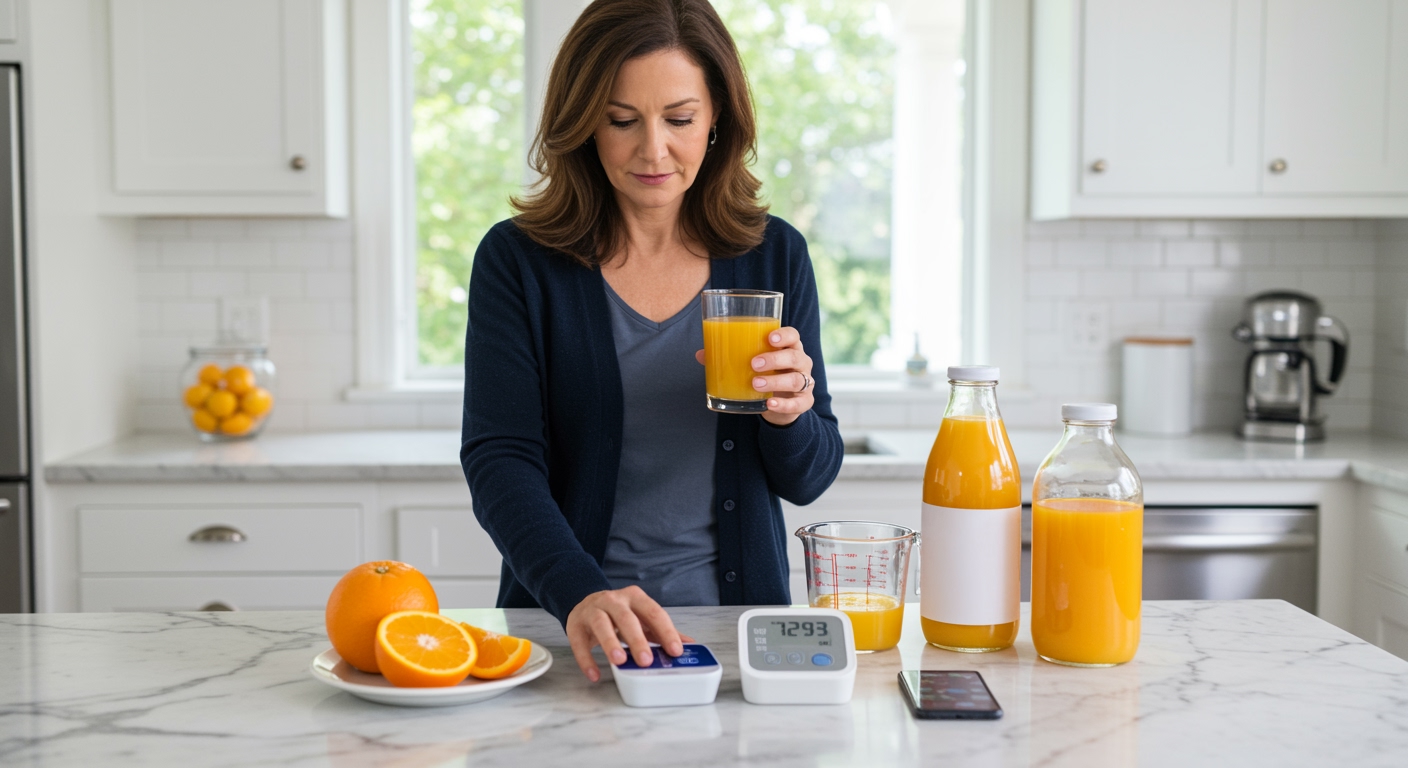✪ Key Takeaway: Orange juice can temporarily lower blood pressure due to hesperidin but high sugar content may cause long-term harm.
Introduction
Your morning glass of orange juice sits on the counter while you check your blood pressure numbers.
You might wonder if this sweet drink helps or hurts your cardiovascular health. Many people with high blood pressure ask this question because orange juice seems like a healthy choice compared to soda or energy drinks.
Hi, I am Abdur, your nutrition coach and today I am going to explain the complex relationship between orange juice and blood pressure.
What Does Research Say About Orange Juice and Blood Pressure?
Scientific studies show mixed results when it comes to orange juice and blood pressure.
A study published in the American Journal of Clinical Nutrition found that drinking orange juice for 12 weeks led to a modest reduction in systolic blood pressure. The participants consumed 500ml of orange juice daily and experienced an average drop of 7 mmHg in their systolic readings.
However, other research tells a different story. Studies focusing on sugar content show that regular consumption of high-sugar beverages can increase blood pressure over time.
The Florida Department of Citrus funded research that specifically looked at hesperidin, a flavonoid found in oranges. This compound showed promising results for blood pressure reduction in controlled studies.
But here is the catch. Most commercial orange juices contain added sugars and lack the fiber found in whole oranges. This changes how your body processes the drink and affects your cardiovascular system.
The timing of consumption also matters. Some studies show better results when orange juice is consumed in the morning rather than evening.
✪ Fact: One cup of orange juice contains about 21 grams of sugar, nearly as much as a can of soda.
How Does Orange Juice Affect Your Blood Vessels?
Orange juice affects your blood vessels through several biological mechanisms.
The hesperidin in orange juice acts as a vasodilator, which means it helps relax the smooth muscles in your blood vessel walls. When these muscles relax, your arteries widen and blood flows more easily.
Vitamin C in orange juice supports nitric oxide production in your endothelium, the inner lining of blood vessels. Nitric oxide is a powerful compound that keeps blood vessels flexible and healthy.
However, the high sugar content triggers a different response. When you drink orange juice, your blood sugar spikes rapidly. This causes your pancreas to release insulin to manage the glucose.
Repeated insulin spikes can lead to insulin resistance over time. When your cells become resistant to insulin, your body produces more of this hormone. High insulin levels can cause your kidneys to retain sodium and water, increasing blood volume and pressure.
The lack of fiber in orange juice makes this problem worse. Whole oranges contain fiber that slows sugar absorption, but juice delivers sugar directly to your bloodstream.
✪ Pro Tip: Choose freshly squeezed orange juice over processed versions to maximize hesperidin content.
Should You Drink Orange Juice If You Have High Blood Pressure?
The answer depends on your individual health status and current blood pressure management strategy.
If you have well-controlled blood pressure and no diabetes risk, a small glass of fresh orange juice occasionally might provide some benefits. The key word here is occasionally, not daily.
People with uncontrolled high blood pressure should be more cautious. The sugar content can interfere with medication effectiveness and contribute to weight gain, which worsens hypertension.
Those with diabetes or prediabetes should avoid orange juice entirely. The rapid blood sugar spike can make glucose control more difficult and indirectly affect blood pressure.
If you decide to include orange juice in your diet, limit yourself to 4-6 ounces per day. This amount provides some beneficial compounds without overwhelming your system with sugar.
Consider diluting orange juice with water to reduce sugar concentration while maintaining flavor. This simple trick can help you enjoy the taste while minimizing potential negative effects.
✪ Note: Always consult your doctor before making dietary changes if you take blood pressure medications.
What Are Better Alternatives for Blood Pressure?
Several alternatives provide cardiovascular benefits without the sugar concerns of orange juice.
Whole oranges offer the same hesperidin and vitamin C as juice but include fiber that slows sugar absorption. The fiber also helps you feel full, preventing overconsumption.
Pomegranate juice contains powerful antioxidants that support heart health. Studies show it can reduce both systolic and diastolic blood pressure. However, it also contains sugar, so moderation is key.
Beet juice has gained attention for its nitrate content. Your body converts these nitrates to nitric oxide, which relaxes blood vessels and lowers pressure. The effect can be quite significant in some people.
Green tea provides flavonoids similar to those in orange juice but without added sugars. Regular consumption has been linked to modest reductions in blood pressure over time.
Plain water remains the best choice for daily hydration. Proper hydration helps your heart pump blood more efficiently and supports healthy kidney function.
✪ Pro Tip: Infuse water with orange slices to get flavor and some nutrients without the sugar overload.
The Bottom Line
Orange juice can provide short-term blood pressure benefits through hesperidin and vitamin C, but the high sugar content poses long-term risks for most people with hypertension.
Health is about making smart choices that serve you in the long run, not just what tastes good in the moment. The occasional small glass of fresh orange juice might fit into a healthy diet, but daily consumption is not advisable for blood pressure management.
I would love to hear about your experience with orange juice and blood pressure in the comments below. Have you noticed any changes in your readings when you drink it regularly? Share your thoughts and questions so we can continue this important conversation about heart-healthy choices.
References
At NutritionCrown, we use quality and credible sources to ensure our content is accurate and trustworthy. Below are the sources referenced in creating this article:





